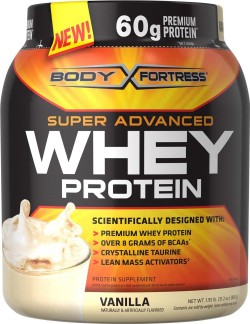Top Class Actions’s website and social media posts use affiliate links. If you make a purchase using such links, we may receive a commission, but it will not result in any additional charges to you. Please review our Affiliate Link Disclosure for more information.

According to the Body Fortress class action lawsuit, the defendants engaged in the practice of “protein-spiking,” also known as “amino-spiking” or “nitrogen-spiking,” in which manufacturers add free-form amino acids and non-protein ingredients to increase the supplement’s nitrogen content while decreasing the manufacturing costs.
“The whey protein industry is a growing and extremely competitive business environment,” the Body Fortress class action lawsuit says. “However, the price of wholesale whey protein keeps increasing and is usually purchased for roughly $15-$18/kilo, making the profit margins on why protein very low.”
Whey protein is a complete protein source that contains all of the essential amino acids that are necessary to build muscle tissue, skin, hair, fingernails and enzymes. According to the Body Fortress class action lawsuit, amino acids do not provide these benefits.
The protein content of many dietary supplements is often determined by measuring the amount of nitrogen it contains. Therefore, protein-spiking tricks consumers into thinking they are purchasing a product that contains more whey protein than it actually contains, the Body Fortress class action lawsuit alleges.
The class action lawsuit alleges that Body Fortress was falsely advertised to cause consumers to believe the product contains more protein than it actually does and seeks to hold the supplement manufacturers accountable for their deceptive claims.
Body Fortress purports to contain 30 grams of protein per serving. However, the false advertising class action lawsuit alleges this number actually includes free-form amino acids. Independent testing has reportedly shown the supplement contains only 21.5 grams of whey protein after the protein-spiking agents are removed.
According to the Body Fortress class action lawsuit, the American Herbal Products Association (AHPA) disputes the practice of protein spiking. The AHPA is a comprised of companies that grow, process, manufacture and market herbal products, and it seeks to promote the “responsible commerce” of herbs, herbal products and dietary supplements.
In April, the AHPA issued guidance on the labeling of protein in food and dietary products, seeking to establish a standard for measuring protein content in dietary supplements. The AHPA defines protein as “a chain of amino acids connected by peptide bonds.” The organization argues that the protein content of dietary supplements should be calculated based on that definition and that non-protein nitrogen-containing substances should not be included in that calculation. The AHPA encourages all supplement makers to adopt this standard of measuring protein content.
The plaintiffs are represented by Parker Waichman LLP, Seeger Weiss LLP and Barbat Mansour & Suciu PLLC.
The Body Fortress False Advertising Class Action Lawsuit is Mencer v. NBTY Inc., et al., Case No. 1:14-cv-05030, in the U.S. District Court for the Eastern District of New York.
ATTORNEY ADVERTISING
Top Class Actions is a Proud Member of the American Bar Association
LEGAL INFORMATION IS NOT LEGAL ADVICE
Top Class Actions Legal Statement
©2008 – 2024 Top Class Actions® LLC
Various Trademarks held by their respective owners
This website is not intended for viewing or usage by European Union citizens.















14 thoughts on‘Protein-Spiking’ Alleged in Body Fortress False Ad Class Action Lawsuit
Please add me
Walmart’s website on this product is loaded with comments on how they were cheated by deceptive advertisement, where label says 6og, but in reality is 30g per scoop. I feel the same way.
I had gastric bypass surgery, and purchased these products for years